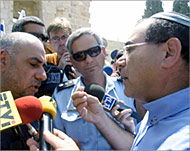The Bedouins: Israel’s forgotten victims
Salem Abu Nadi was making the final preparations for his wedding last month when an Israeli bulldozer, escorted by some 10 army and border police jeeps, suddenly descended on his village of Abu Tallul outside the southern Israeli city of Bir Shiva.

An Israeli helicopter gunship hovered ominously overhead.
Within minutes, the bulldozer had levelled his four-room apartment, smashing the new furniture he had just bought and ravaging all his dreams.
The young Bedouin’s ordeal is only one example of the chronic plight haunting tens of thousands of Bedouin Arabs in Israel.
Unlike the Palestinians in the occupied West Bank and Gaza Strip, the Bedouins are Israeli citizens, many of whom actually serve in the Israeli army.
This, however, doesn’t seem to prevent Israel from hounding them, mainly for the purpose of seizing whatever land they still own.
Today the Bedouin population in Israel is approximately 200,000, with the majority concentrated in the southern Negev region. The rest live in small agricultural villages in the northern Galilee region.
Ethnic cleansing
As nominal citizens, the Bedouins carry Israeli identity cards, serve in the Israeli army and vote in elections.
However, like other Arabs with Israeli citizenship, they have been the target of an unmitigated campaign of ethnic cleansing, aimed at driving them from their land and confining them to small hapless villages, unfit for the Bedouin lifestyle.
Historically speaking, the main Bedouin tribes owned the bulk of the Negev region, which takes up about 60% of the land in Israel.
However, Israel cannot accept this fact mainly for ideological reasons since Zionism teaches that all the land in Palestine belongs “exclusively and solely to the Jews.”
Consequently, the Israeli state, which expelled up to 90% of the Bedouin population in 1948, also confiscated more than 90% of their land.
|
“Their real goal is simply to take over our land.” Talab al-Sana, Bedouin member of Israel’s Knesset |
Now, Israel is after the remaining 10% and is doing so under the pretext of “development of the Bedouin sector.”
“Under the rubric of development, the Israeli state is seeking to cage the Bedouins inside miserable ghettos in order to usurp their land which they have owned for a long time. We are talking about a great theft of our land by Israel,” says Talab al-Sana, a Bedouin member of Israel’s Knesset or parliament.
“Their real goal is simply to take over our land,” he said.
In an effort to do this, successive Israeli governments have sought to force the Bedouins to abandon their land, employing a variety of tactics.
“Green patrols”
Nearly 20 years ago, the Israeli government created the so-called “green patrols,” for the purpose of harassing Bedouins, demolishing their “illegal” homes, destroying and burning their fields and grazing areas.
Last month these “green patrols” knocked down 10 Bedouin homes in Negev. As in the West Bank and occupied East Jerusalem, the pretext was ready: the houses were allegedly built without licences.
And then there is the scandal of “unrecognised villages”, many of which actually predated the state of Israel itself.
The unrecognised villages are made up of zinc, metal shacks and tents used as houses in the middle of the Negev Desert. Tens of thousands of Bedouins live here.
However, Israel does not recognise them, denying the population of basic services including water, sewage systems, electricity, health services, eductation and other infrastructure.
 |
|
Likud deputy Yehiel Hazan (R): Under |
According to the Regional Council of Unrecognised Villages in the Negev (RCUVN), Israel’s refusal means 20,000 Bedouin homes are under threat of destruction.
Of these houses, over 100 are destroyed on average each year, with the rate rising considerably under the right-wing Likud governments.
This policy is having a catastrophic impact on the Bedouins.
Unemployment among men is 60% and 85% among women, according to RCUVN.
Only 13% of students who go on to high school pass matriculation exams. About 60% of the students have dropped out of school.
Poverty
Poverty is rampant in Negev. The infant mortality rate is soaring. In 2003, the State Comptroller’s report identified six out of seven Bedouin villages in the Negev as the poorest in economic, social, educational and health spheres. The Bedouin village of Kseifeh is the poorest community in Israel.
The problems facing Bedouins, indeed the rest of the Arab community in Israel, have their roots in the supremacist nature of the Jewish state.
There are two laws granting citizenship in Israel: one for Jews called the law of return and a second for non-Jews.
Jews are granted automatic citizenship once they arrive in Israel and prove their Jewish identity.
Non-Jews are given the same citizenship but it is no guarantee for equality under the law since nationality – not citizenship – is the chief criteria determining state policies.
Even if this inferior citizenship is granted, non-Jews live as lesser citizens and are “tolerated permanent residents.”
“They (Israel) don’t and won’t consider us equal citizens for the simple reason that we are not Jewish. If we want to attain equal rights in Israel, we will have to convert to Judaism,” said Ahmad Azazmeh, a Bedouin teacher.